Happy Tuesday! The social media app “BeReal” is premised on the idea that once a day, at a random time determined by the app, you take a picture of yourself and whatever you’re doing and share it with your followers.
Easy enough, but it leads to some awkward moments when you’re the prime minister of France and your party just got blown out by its nemesis. Time to be—a little too—real.
Quick Hits: Today’s Top Stories
- The Supreme Court on Monday ruled—in a 6-3 decision along ideological lines—that former presidents have some immunity from criminal prosecution for “official acts” taken while they were president. “Under our constitutional structure of separated powers, the nature of Presidential power entitles a former President to absolute immunity from criminal prosecution for actions within his conclusive and preclusive constitutional authority,” Chief Justice John Roberts wrote for the majority. “And he is entitled to at least presumptive immunity from prosecution for all his official acts.” In a dissenting opinion joined by Justices Ketanji Brown Jackson and Elena Kagan, Justice Sonia Sotomayor wrote that the decision “effectively creates a law-free zone around the president, upsetting the status quo that has existed since the founding.” The high court remanded final judgment over whether many of former President Donald Trump’s actions related to his efforts to overturn the 2020 election were official or unofficial to D.C. District Court Judge Tanya Chutkan. In a unanimous decision, the court likewise sent Moody v. NetChoice—a case that centered on efforts by Texas and Florida to pare back social media content moderation—back to the lower courts for further analysis.
- Four men were detained by Ukrainian authorities on Sunday for their alleged involvement in a Moscow-backed coup plot against the Ukrainian government, according to the country’s domestic intelligence agency. The suspects are allegedly part of a group that sought to incite a riot, take over the country’s parliament building, and replace Kyiv’s political and military leaders, including Ukrainian President Volodymyr Zelensky. The alleged perpetrators were charged with treason by the Ukrainian government and will be held in custody ahead of their trial.
- A Department of Labor rule adopted in April took effect on Monday, granting overtime pay to salaried workers making under $844 per week or $43,888 per year—more than $8,000 a year higher than the previous threshold of $35,568 and affecting about 1 million workers. Next year, the threshold will be raised again to $58,656, expanding overtime benefits to include an additional 3 million workers, according to the Biden administration. On Friday, a federal judge in Texas blocked the regulation from going into effect for Texas state employees—holding that the rule improperly bases its standard for receiving overtime compensation on the rate of pay rather than job duties—pending a challenge from Texas at the 5th Circuit Court of Appeals.
- Longtime Trump adviser Steve Bannon reported to prison on Monday, after he was convicted in 2022 on two counts of contempt of Congress for refusing to sit for a deposition or provide documents to the House Select Committee on the January 6 Attack. Bannon, who sought repeatedly to appeal and delay his sentence, will remain in a federal prison in Danbury, Connecticut, until just days before the 2024 election.
- The Republican-led House Judiciary Committee on Monday sued Attorney General Merrick Garland for not releasing audio tapes of an interview between President Joe Biden and special counsel Robert Hur, who was investigating Biden’s mishandling of classified documents prior to his presidency and who noted the president’s “poor memory” in his final report. Garland has argued that Biden’s invocation of executive privilege over the tapes overruled the House committee’s subpoena to access them, but the Republicans’ suit contends that “Garland violated, and continues to violate, his legal obligation by refusing to produce to the Committee the audio recordings.”
- Hunter Biden sued Fox News on Monday over a miniseries it aired on its streaming service in 2022, depicting a fictionalized trial of the president’s son focused on his foreign business ties. The series featured nude photos of the younger Biden, which his lawsuit contends amounted to a violation of New York’s so-called “revenge porn” law and served “to humiliate, harass, annoy, and alarm Mr. Biden and to tarnish his reputation.” Fox News, in response, has suggested that its content is protected under the First Amendment. “Consistent with the First Amendment, FOX News has accurately covered the newsworthy events of Mr. Biden’s own making,” Fox News said in a statement. “We look forward to vindicating our rights in court.”
SCOTUS Term Goes Out With a Bang
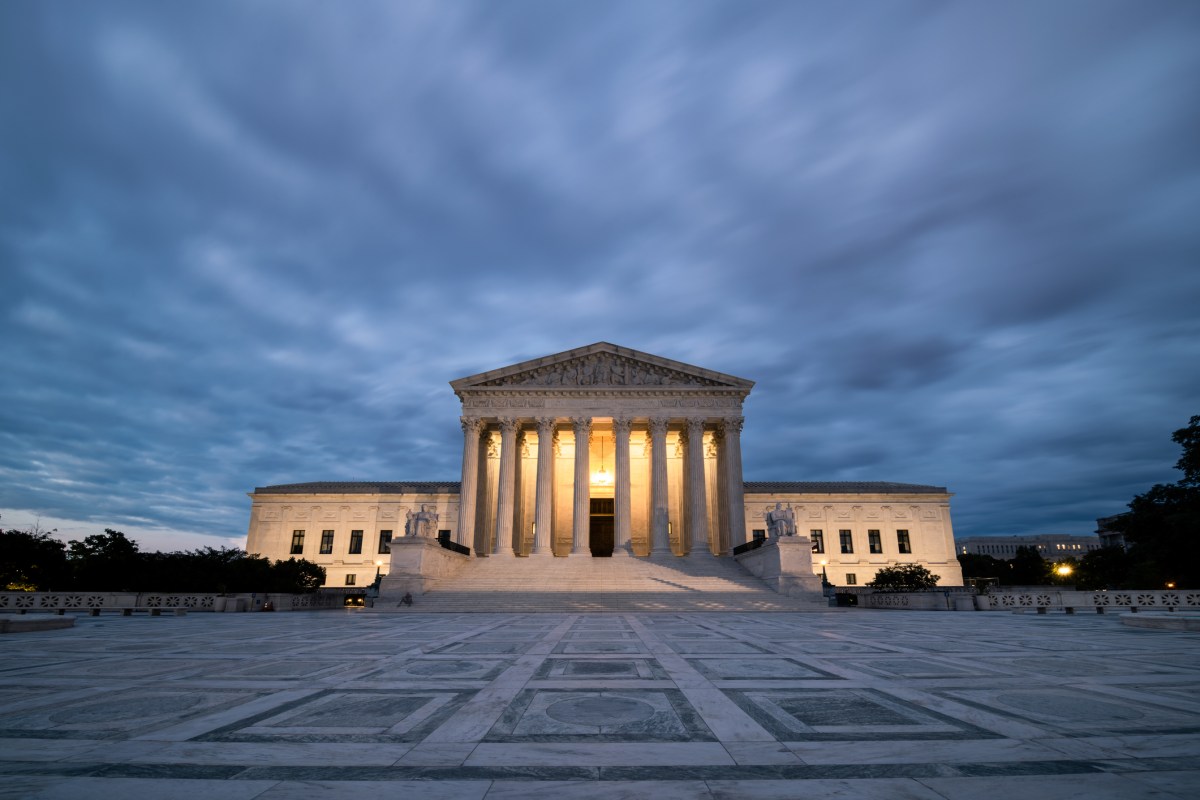
When the Supreme Court heard oral arguments in the case of Trump v. United States on the question of presidential immunity from prosecution, there was laughter in the chamber as Justice Samuel Alito proposed a hypothetical having to do with a president ordering SEAL Team Six—elite U.S. Navy commandos—to do something “plausibly” illegal, even if the president clearly had a right to give them an order.
It seemed an outlandish hypothetical at the time—and indeed, Alito caveated the notion by saying the U.S. Navy officers could not follow orders that would require them to break the law. But after the Supreme Court’s 6-3 ruling on Monday holding the president had absolute immunity from prosecution for some core executive functions, it’s safe to say the scenario wasn’t put to bed quite as conclusively as we might have expected.
The court on Monday granted some immunity to presidents for official acts performed while in office, placing presidential activity into three “buckets,” to coin a phrase: private acts, core presidential functions, and all other official acts for which the president has “presumptive” immunity. Many questions remain about how that ruling—which former President Donald Trump hailed as a victory—will play out in practice, including what exactly constitutes an official act of the president and how courts should make that determination, as well as what effect this will have on the cases against Trump currently winding their way through the court system.
The decision was handed down with high drama, the third of the day and the very last of the term. Chief Justice John Roberts penned the majority opinion, joined in full or in part by the five other conservative justices, which held that a president is “immune from prosecution for an official act unless the government can show that applying a criminal prohibition to that act would pose no ‘dangers of intrusion on the authority and functions of the executive branch.’”
So why is the court ruling on presidential immunity? It started with the four-count indictment special counsel Jack Smith brought against Trump last August. The former president’s legal team moved in October to have the special counsel’s charges dismissed on the grounds that a president has absolute immunity for any actions taken while in office.
The judge in the case, Tanya Chutkan, issued a sweeping ruling against the former president in December, holding that former presidents had no immunity at all from criminal prosecution for acts performed while in office. “Defendant’s four-year service as commander in chief did not bestow on him the divine right of kings to evade the criminal accountability that governs his fellow citizens,” she wrote in the ruling.
A three-judge panel on the Washington, D.C., Court of Appeals took up the immunity question in January and affirmed Chutkan’s ruling in February. The Supreme Court decided to hear the immunity question three weeks later.
On Monday, the justices provided their answer. As was anticipated, the court disagreed with the D.C. circuit’s expansive position that a former president can be prosecuted for any official act once out of office. But the majority opinion not only rejected the lower court’s ruling, it also articulated a new, broad vision of “absolute immunity” from criminal prosecution for a president’s “actions within his conclusive and preclusive constitutional authority.”
In other words, if the conduct in question involves the exercise of a “core” executive power clearly outlined in the Constitution—like pardoning or removing appointed executive branch officials—then the president is immune from criminal prosecution, full stop. “Congress cannot act on, and courts cannot examine, the president’s actions on subjects within his ‘conclusive and preclusive’ constitutional authority,” Roberts wrote.
The majority added that the president’s intentions—however corrupt—cannot and do not provide an exception to this absolute immunity, nor can they be used to help parse whether an action was itself private or official. “Such a ‘highly intrusive’ inquiry would risk exposing even the most obvious instances of official conduct to judicial examination on the mere allegation of improper purpose,” Roberts asserted.
The idea that there are some activities for which a president could never be prosecuted—regardless of obvious nefarious motives—raises some problematic hypotheticals for the use of presidential power, as Sarah and David pointed out on yesterday’s episode of Advisory Opinions. The president, for example, presumably now has free reign to corruptly deploy exclusive executive power, like by selling pardons to the highest bidder. The ruling creates “an almost sovereign view of immunity,” David said.
There is a second bucket of so-called “official” acts for which a president could face prosecution: those “within the outer perimeter of his official responsibility,” Roberts wrote, without explicitly defining what kind of acts might fall within this “outer perimeter.”
“Such an immunity is required,” he nevertheless argued, “to safeguard the independence and effective functioning of the Executive Branch, and to enable the President to carry out his constitutional duties without undue caution.”
To overcome such “presumptive immunity” for certain official acts, prosecutors would have to show they weren’t intruding “on the authority and functions of the Executive Branch.” Only once that extremely high bar had been cleared—likely affirmed by a court ruling—could such prosecution move forward.
In the final bucket, the Supreme Court did affirm that the president has no immunity for unofficial acts—things that have nothing to do with the job of the presidency. In that regard, a president would be just as open to prosecution as any of us commoners.
The trick now for the Smith case is deciding what alleged conduct in the indictment constitutes an official act (as well as which kind of “official”) and what constitutes a private act. The district court will now have to determine “which part of this was candidate Trump,” Gabriel Malor, a Virginia appellate lawyer, told TMD. “Is the January 6 speech candidate Trump or President Trump? Is the fake electors scheme candidate Trump or President Trump?”
On one of these questions, the Supreme Court made it easy. Trump is alleged to have threatened to fire then-acting Attorney General Jeffrey Rosen after Rosen refused to go along with the former president’s efforts to cast doubt on the election results and pressure the states to submit fraudulent alternate slates of electors. Monday’s majority opinion says that clearly falls within the president’s “core” executive acts, and so for that conduct Trump is immune from prosecution.
Trump’s efforts to pressure former Vice President Mike Pence into stopping the certification of the 2020 election results on January 6, however, could potentially fall outside the presumptively immune activity. While the majority opinion remanded the specific question to the district court, Roberts suggested prosecutors could argue that Pence’s role as president of the Senate is not an executive branch function—but rather a legislative role under Article I of the Constitution. If so, the president’s communications about that role could be prosecuted without intruding on the function of executive authority.
Trump could also face legal exposure for his communications with private attorneys and state-level officials pushing for the election to be overturned, as well as his public statements to supporters on January 6—which may be considered private actions.
Justice Amy Coney Barrett’s concurring opinion on Monday provided a roadmap for prosecutors on some of this conduct. “For example, the indictment alleges that the President asked the Arizona House Speaker to call the legislature into session to hold a hearing about election fraud claims,” she wrote. “The President has no authority over state legislatures or their leadership, so it is hard to see how prosecuting him for crimes committed when dealing with the Arizona House Speaker would unconstitutionally intrude on executive power.”
As our own David French explained, “No one should think that this [opinion] means that as a legal matter, the case against Trump is in jeopardy in its totality.” Trump can definitely be prosecuted for the “unofficial” conduct related to his effort to hold onto power—and potentially also the “official” conduct on the perimeter.
Nevertheless, the former president was quick to claim this ruling for his column. “BIG WIN FOR OUR CONSTITUTION AND DEMOCRACY,” Trump wrote on Truth Social at 10:41 a.m. ET, just minutes after the court had published its decision. “PROUD TO BE AN AMERICAN!”
Trump continued “truthing” in that vein for the rest of the day, praising the wisdom of the decision even if it’s perhaps something of a mixed bag for him legally. “THE SUPREME COURT DECISION IS A MUCH MORE POWERFUL ONE THAN SOME HAD EXPECTED IT TO BE,” he wrote Monday afternoon. “IT IS BRILLIANTLY WRITTEN AND WISE, AND CLEARS THE STENCH FROM THE BIDEN TRIALS AND HOAXES, ALL OF THEM, THAT HAVE BEEN USED AS AN UNFAIR ATTACK ON CROOKED JOE BIDEN’S POLITICAL OPPONENT, ME. MANY OF THESE FAKE CASES WILL NOW DISAPPEAR, OR WITHER INTO OBSCURITY. GOD BLESS AMERICA!”
Despite what the former president suggested, the cases are unlikely to just “disappear”—at least not before the election—and he certainly didn’t get everything he wanted. At the most fundamental level, in fact, the court shot him down: “Trump asserts a far broader immunity than the limited one we have recognized,” the chief justice wrote in the majority opinion.
But Trump may be less interested in the legal question than the logistical one: While the former president remains in legal jeopardy, the timeline for an actual verdict in the case has almost certainly been extended beyond November’s election. The district court will now take some days—or weeks—to deliberate on the question of whether the alleged conduct is official or private. Once the court has ruled, Trump will have an opportunity to appeal yet again, which itself could take weeks or longer.
Plus, the former president is already trying to use the ruling to overturn his 34-count conviction in May in New York City. Trump’s lawyers reportedly plan to argue that the jury in that case heard evidence that should have been privileged under this new standard of presidential immunity.
There’s only one person for whom the Supreme Court’s ruling is even more immediately relevant: President Joe Biden. “With today’s Supreme Court decision, once again it will depend on the character of the men and women who hold that presidency that are going to define the limits of the power of the presidency because the law will no longer do it,” Biden said in a brief evening address at the White House on Monday. “I know I will respect the limits of the presidential powers I’ve had for three-and-a-half years, but any president, including Donald Trump, will now be free to ignore the law.”
Biden concluded by noting that he concurred with Justice Sonia Sotomayor’s dissent in the case, and indeed, her opinion painted a bleak picture of a brave new world under the majority ruling. “The President of the United States is the most powerful person in the country, and possibly the world,” Sotomayor wrote. “When he uses his official powers in any way, under the majority’s reasoning, he now will be insulated from criminal prosecution. Orders the Navy’s Seal Team 6 to assassinate a political rival? Immune. Organizes a military coup to hold onto power? Immune. Takes a bribe in exchange for a pardon? Immune. Immune, immune, immune.”
Roberts criticized the dissent’s “tone of chilling doom” as “fearmongering on the basis of extreme hypotheticals,” arguing Sotomayor ignores “the more likely prospect” of presidents prosecuting their successors and future leaders of the free world unable to carry out their duties.
But Trump’s presidency and his current candidacy lend credence to both the majority and the dissent’s nightmare scenarios. He tried to violently overthrow an election the last time around and is now threatening to prosecute his political opponents this time around. As Mike and Sarah noted in yesterday’s Collision:
In the end, perhaps this is the real debate. Which prospect is scarier: an unaccountable president breaking the law with impunity or former presidents routinely being convicted of failing to secure the border or protect the environment after leaving office? What types of people would run for president if they thought they’d likely be prosecuted upon leaving? Then again, we have no history of that kind of abuse, and yet the most recent president did in fact try to stay in power after losing a free and fair election.
The question of which future is more frightening—and whether Trump’s prosecution will continue, since at least in this case it will not be concluded before the election—now lies with voters. “If President Biden wins, then the case will continue,” Malor told TMD. “If President Trump wins the election, then this case is finished.”
The Dispatch’s Fifth Editorial
Last week’s presidential debate laid bare the devastating reality of President Joe Biden’s condition, and the Dispatch Editors argue on the site today that Democrats have a difficult—but obvious—decision to make:
Elected Democrats and their allies in the media have made a habit over the past decade of spotlighting their Republican counterparts’ cowardice, and they’ve been right to do so. Presented with ample opportunities over the years to stand up to the demagogue who hijacked their party and their movement, the vast majority of GOP lawmakers and right-wing pundits opted time and again for political expediency, self-preservation, and the path of least resistance. They’ve sacrificed their principles, abandoned the importance of decency and honor, and contributed to the spread of dangerous lies—because to do otherwise might cost them an election, their audience, or their proximity to power.
Democrats like Pelosi have had no problem diagnosing such gutlessness when it comes with an R next to its name. “This is about being afraid,” she said last summer about then-Speaker Kevin McCarthy’s efforts to retroactively expunge Donald Trump’s impeachments. “These people look pathetic.” Implicit in such criticism is the idea that her party would never stoop to such a level.
But now faced with a collective-action problem of their own, most leading Democrats’ moral clarity has vanished. Several prominent media figures have broken from the party line, but the ongoing effort by Biden’s allies to shut down legitimate questions about the president’s clearly deteriorating faculties—as well as his ability to carry out his current job responsibilities—is as shameless and irresponsible as just about anything Trump and his enablers have done over the past eight years. And if Biden refuses to step aside, it’d be an act of political selfishness surpassed in recent memory only by Trump’s efforts to remain in office after losing the 2020 election.
In press releases and on cable news, the Biden campaign has repeatedly insisted that “90 minutes does not negate three-and-a-half years of results.” Setting aside that fewer than 4 in 10 voters approve of those “results” and only 1 in 4 believe the country is on the right track, a second term in office is not a reward for a job well done. No, presidential elections are forward-looking, and this coming November’s contest will be a referendum on whether the incumbent can effectively do the job for another four years. He cannot.
Worth Your Time
- Our very own Jonah Goldberg joined Damon Linker on his Notes From The Middleground Substack to discuss the future of conservatism and the Republican Party, proposing several reasons the GOP may have descended into populism—from the Rush Limbaugh effect to Americans’ propensity be fall for con men. “I think the Trumpification of the GOP is what social scientists call an ‘overdetermined’ phenomenon,” Jonah told Linker. “I can agree with all of your proposed explanations to one extent or another for some conservatives or some Republicans. But I don’t think any one of them alone explains what’s happened, or why. Again, I don’t think this explains everything, not even close. But the behavior of the left elicited a response from the right. I am happy to concede that the way Rush Limbaugh. Fox, et. al. covered the left and the Democrats made the right’s response worse than it should have been in some respects,” Jonah noted. “And that gets me to the explanation [that] is most sorely missing from your menu. … What I think is missing from a lot of these kinds of debates is that we overlook the fact that both right and left suffer from many of the same problems.”
- How did New York Times columnist David Brooks come away from his interview with longtime Trump ally Steve Bannon in 2019? “I felt like I was talking with Leon Trotsky in the years before the Russian Revolution,” Brooks wrote for the Times. Brooks checked in with Bannon again before he reported to jail on Monday, to see how the right-wing provocateur and Trump confidant views the current moment. “I’m not a journalist,” Bannon told Brooks, describing his “War Room” podcast. “I’m not in the media. This is a military headquarters for a populist revolt. This is how we motivate people. This show is an activist show. If you watch this show, you’re a foot soldier. We call it the Army of the Awakened. … So even though [viewership] may not be the biggest, it doesn’t have to be. It’s the people that are out there in the hinterland that are on the school boards. They now control so many state parties. Our mantra is you must use your agency. It’s a spiritual war. The divine providence works through your agency.”
Presented Without Comment
New York Times: Stephen Bannon Goes to Prison, but His Podcast Won’t Stop
He has prepared for this moment for months, he said, enlisting a team of nearly 20 guest hosts to continue pumping out the show, which streams its distinctive stew of unvaryingly pro-Trump political patter for four hours a day, Monday through Friday, and for two additional hours on Saturdays.
That group includes Andrew Giuliani, the son of Mr. Trump’s former lawyer Rudolph W. Giuliani; Mr. Bannon’s daughter, Maureen; Noor bin Laden, the niece of Osama bin Laden, who is known for her belief in conspiracy theories; and Jeffrey Clark, who served in the Justice Department under Mr. Trump and faces criminal charges in Georgia in connection with efforts to overturn Mr. Trump’s 2020 election loss there.
Also Presented Without Comment
National Review: Jill Biden, Featured on Cover of Vogue, Vows to ‘Continue to Fight’ after Disastrous Debate
Also Also Presented Without Comment
Daily Beast: Watergate Reporter Carl Bernstein: Biden Has ‘Bad Days’
Carl Bernstein, the former Washington Post reporter and current CNN political analyst, said on the air Monday that he has heard from sources “very close” to President Joe Biden who say that his poor debate performance last Thursday was not a rarity.
As concerns about the president’s age and fitness for office mount, Bernstein told AC360 anchor Anderson Cooper that his sources “are adamant that what we saw the other night—the Joe Biden we saw—was not a one-off,” and “that there have been 15, 20 occasions in the last year, year and a half, when the president has appeared somewhat as he did in that horror show that we witnessed.”
In the Zeitgeist
Quincy Wilson—the 16-year-old track and field phenom from the Washington, D.C., area—will become the youngest American male track athlete to compete in the Olympics when he arrives in Paris at the end of this month. We’re very excited not just to see him race, but for more of his fantastic post-race interviews.
Toeing the Company Line
- In the newsletters: Kevin rebutted (🔒) the notion that Americans can vote for an “administration” come November and not the president himself, the Dispatch Politics crew checked in on Democrats’ damage control after Biden’s poor debate performance last week, Nick argued (🔒) that the Bidens are setting themselves up to be villains of history, and Sarah and Mike broke down the presidential immunity decision in The Collision.
- On the podcasts: Sarah and David tackled the presidential immunity decision on an emergency edition of Advisory Opinions.
- On the site: Chris compares the coming Trump-Biden rematch to the 1944 presidential election, Charlotte reports on a blueprint for post-war Gaza circulating in the Israeli government, and Timothy Sandefur argues that the Supreme Court made the right call in its NetChoice decision released Monday.
Let Us Know
What do you make of the argument the editors laid out in their editorial today?



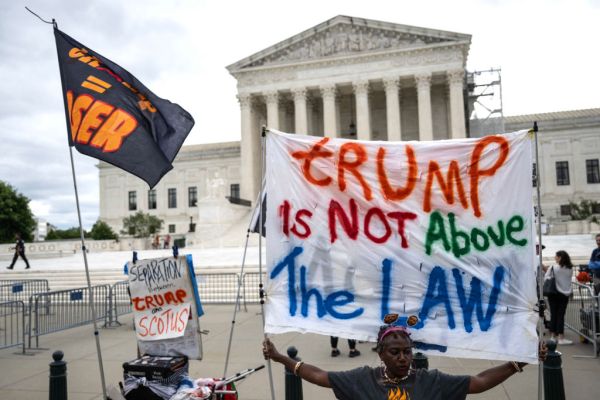
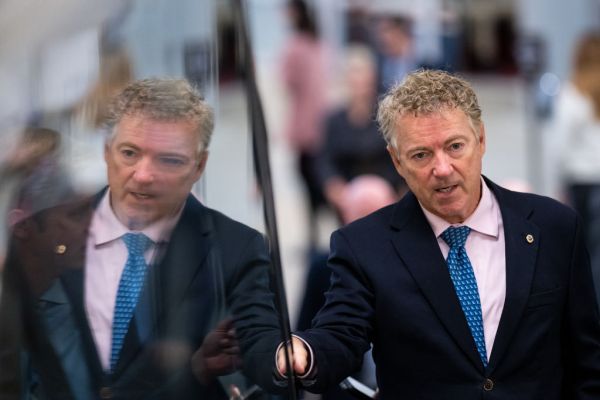
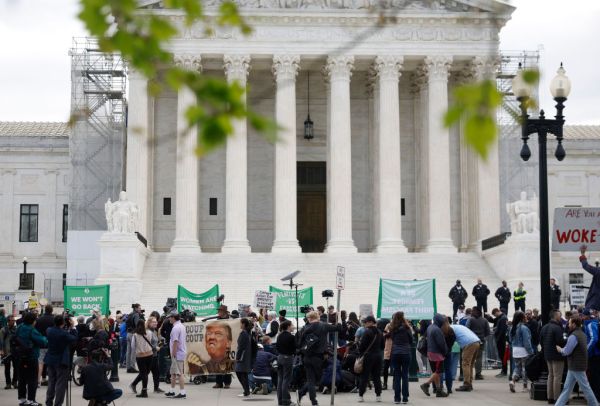

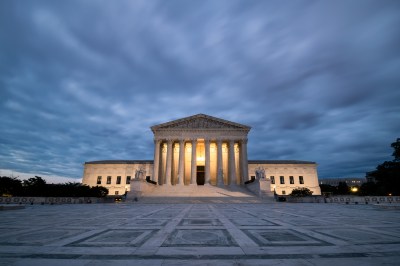
Please note that we at The Dispatch hold ourselves, our work, and our commenters to a higher standard than other places on the internet. We welcome comments that foster genuine debate or discussion—including comments critical of us or our work—but responses that include ad hominem attacks on fellow Dispatch members or are intended to stoke fear and anger may be moderated.
With your membership, you only have the ability to comment on The Morning Dispatch articles. Consider upgrading to join the conversation everywhere.